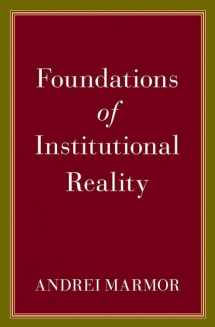
Foundations of Institutional Reality
Book details
Summary
Description
In Foundations of Institutional Reality, Andrei Marmor provides a novel account of the ontological foundations of institutional facts, and argues that there are important epistemic and methodological implications that follow from this ontology. Marmor offers a grounding-reductive account of collective attitudes that comports with methodological individualism. He argues for a functional explanation of the constitutive relations between rules and practices, challenging Searle's influential distinction between constitutive and regulative rules.
The first part of the book offers a detailed reductive account of institutional facts by way of metaphysical grounding. It shows that an ontology of institutional facts requires an ontology of social rules, and the latter depends on a reductive account of collective attitudes. The second part of the book aims to show that there are a number of important epistemic and methodological conclusions that follow from the ontology of institutional facts. First, that there are certain types of comprehensive, group-wide, errors about the socially constructed aspects of reality that are not metaphysically possible. The second methodological argument is that a metaphysical account of institutional reality does not have to provide an explanation of the relevant social practices in terms that would rationalize the practice for the participants themselves. Finally, the last chapter explains the idea of hierarchical practices, arguing that basic social power-structuring rules function to transform
brute power into an elaborate normative framework, constituting authoritative institutions that are central to our institutional reality.


We would LOVE it if you could help us and other readers by reviewing the book
Book review



